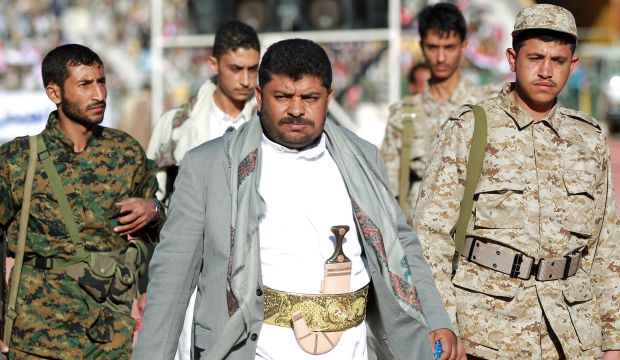
The president of Yemen’s “Revolutionary Council,” Mohammed Ali Al-Houthi, takes part in a gathering of Shi’ite Houthi movement in a northern Sana’a stadium on February 7, 2015. (AFP Photo/Mohammed Huwais)
Sana’a and Riyadh, Asharq Al-Awsat—Recent moves by the Shi’ite Houthi movement to dissolve parliament and form a new government in Yemen are “unconstitutional,” according to alleged Houthi ally former president Ali Abdullah Saleh.
Saleh, whom many in Yemen believe has aided the group’s gradual takeover of state and military institutions and facilities throughout the country, denounced the “constitutional declaration” issued by the Houthis on Friday as invalid.
Speaking to reporters in Sana’a on Saturday, he said such a declaration could only come from “a constitutional president who announces it while drawing on that constitution, and not in the form of a unilateral political announcement masquerading as a constitutional one.”
In last week’s announcement, the Houthis said they were dissolving Yemen’s parliament and forming a new government via an interim “Revolutionary Committee” to oversee the country’s political transition.
The committee—which is led by Mohammed Ali Al-Houthi, cousin of the group’s leader Abdul Malik Al-Houthi—is now the highest authority in the country and has already appointed defense and interior ministers.
It will be tasked with forming the new 555-member parliament and also establishing a five-member presidential council to assume the responsibilities of the presidency vacated last month by Abd Rabbuh Mansur Hadi.
Following Hadi and premier Khaled Bahah’s resignations, the Houthis gave Yemen’s political factions in the country a three-day deadline of last week to form a transitional government.
Despite the efforts of UN special envoy Jamal Benomar, no deal was reached between the various political factions to resolve the situation, and the deadline passed without an agreement.
The Houthis have been spreading throughout the country, attempting to capture government and military buildings and institutions since its members spread throughout Sana’a and then other parts of the country in September, with many in Yemen alleging that political and military forces loyal to Saleh have aided the group’s advance.
Many in the country and outside also believe Iran has been supporting the Houthi takeover of the country. A Yemeni political source told Asharq Al-Awsat on Saturday that Iran was “behind everything that is going on in Yemen right now,” and that roughly 300 of the group’s fighters were currently receiving military training in Iran.
The source also praised the “clear strategic position” taken by the six-member Gulf Cooperation Council (GCC), which on Friday described the latest Houthi power bid as a “coup” against the Yemeni state.
In a statement the GCC said it would be taking “all the necessary measures” to safeguard the interests of the Yemeni people as well as its own interests in Yemen, whose security and stability, it said, were directly tied to that of the wider region.
Yemen, the Arabian Peninsula’s poorest country, has witnessed great turbulence since mass public protests forced Saleh to step down as president in November 2011, after more than three decades in power.
As well as facing a potential breakaway by areas in the south keen to reinstate the former independent state of South Yemen, the country is also home to an Al-Qaeda franchise, Al-Qaeda in the Arabian Peninsula (AQAP), one of the world’s deadliest terrorist groups.
Additional reporting from Sana’a by Hamdan Al-Rahbi and from Riyadh by Huda Saleh.
